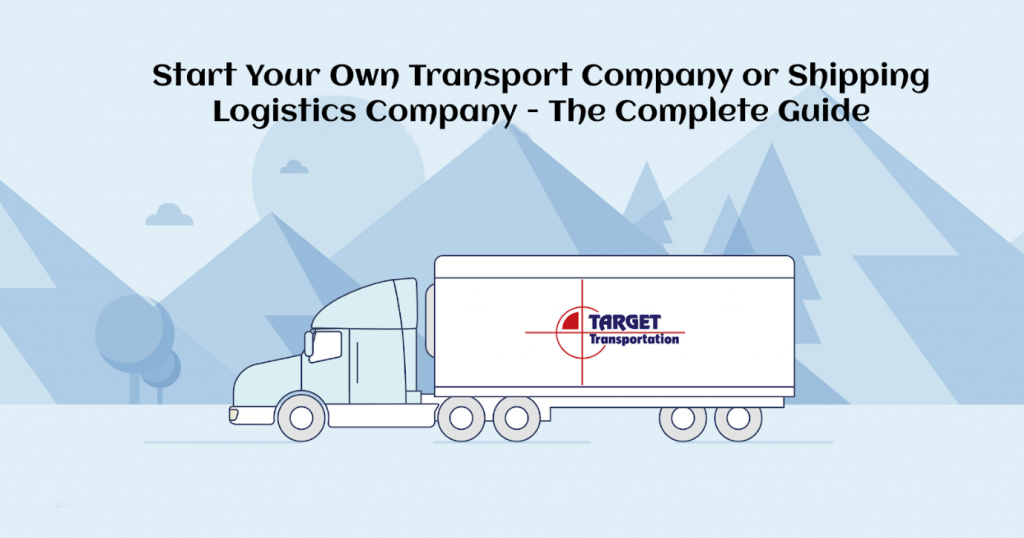Transportation service and shipping logistics play a critical part both locally and globally, as everything we utilize on a consistent day to day basis is shipped and delivered across multiple destinations before selling and putting to use.
Are you thinking of commencing your own transport or shipping logistics company? While getting into the sector is not tight, sustaining success as a company has many challenges. If you are initiating with an Intermodal Transport, you require making sure you are ready for high competition.
However, if your business planning, funds, and recruitment tactics as a transport company are effective, no one can stop you in this industry.
Here, we have brought for you a complete guide to start your own shipping and logistics company:
1. What costs are involved when starting a transportation business?
The fundamental calculations of finances are required when launching a start-up transport or shipping company.
- One needs to set up the capital sources and reserve it to get your business on the go. Numerous options comprise the bank and investors.
- One also requires dealing with expenses connected with the logistics industry, such as the license and toll expenses, maintenance, fuel, employee training costs, and day to day operating expenses.
- Investment in a location
- The security features, such as vehicle trackers
- Employee salaries on a monthly basis
2. What should I explore when purchasing the fleet?
Selecting the precise vehicles for your shipping and logistics company means your drivers will have the spot on a vehicle for the job. This scenario leads to competence and swiftness of service.
Discovering what vehicles you necessitate now will assist you to have a clearer idea of how much vehicle finance to apply for when you connect with a bank or investor for transport financing preferences.
If you are moving forward with new vehicles for your business, you will gain from a complete warranty and better service plans. You also need to finalize what sort of supplies your vehicles will be used for, the carrying volume of supplies, and the categories of terrains you will be driving.
3. How can I get vehicle finance for my company?
The cost of vehicle financing in a shipping and logistics business is the most considerable expense you will have to handle. You can consider the subsequent options:
- Installment sale in which model some amount is payable as a deposit; further, your installments are all set, and you own the vehicle at the end of the complete paid term.
- The rental agreement and financial lease, where the usage of vehicles is paid-out from the business revenue, no upfront payment is needed, but the ownership is to the lessor.
4. Where can I get training assisting me in initiating this business?
The Road Traffic Management Corporation offers training courses and certifications, such as a certificate in Freight Handling. There are many training institutions in this field. The Department of Public Transport, Roads, and Works issue the operating licenses. A National Certificate in Driving is a precious qualification that furnishes with an array of diverse capabilities.
Further, it is highly significant to look for a qualification that has been recognized by the Transportation and Training Authority.
5. How do I employ staff to work for my business?
The essential components of your business, in addition to your vehicles, are your vehicle drivers. Your drivers need to attain the applicable licenses ahead of they can be well-thought-out legally to work and operate your vehicles in your transport business.
6. How do I get clients and suppliers for my business to grow?
Proper planning for getting clients has to be before beginning the business, and so it is sensible to shun the ad-hoc company. It is relatively swift and straightforward to acquire a client through a computer, a smartphone, and a good internet connection.
Satisfied clients and suppliers value reliable service, and it becomes easier to retain them by delivering higher quality services.
7. How to decide on a physical location for your business?
Having an office where you can meet with your stakeholders and clients assists with the right business image. Also, you will most probably require getting hold of space for product warehousing. You should select rental properties that are positioned near to the shipping hubs.
Key Takeaways
You need to obtain the necessary licenses, get the business finances, and your taxes right in order. You also need to create a clear-cut business plan, get familiarized with the daily operations and competitors.
However, despite the multiple challenges that come with enabling a flourishing transport and logistics business, customers like to know that you are facilitating them with the best services. And the consistency of this service is vital to generate loyalty from these client companies.
Further, it is always suitable to commence out with logistics; you are best skilled to manage and start working your way right from there, further building a successful company.

Pingback: 10 Advanced Technologies That Will Change The World | Guest Posts Hub
Pingback: 10 Tips for Reducing Freight Transportation Services Expenses | Guest Posts Hub
Pingback: Towards A Sustainable Shipping Industry
Pingback: How Logistics Companies Can Adapt To The Rise Of Same-Day Delivery